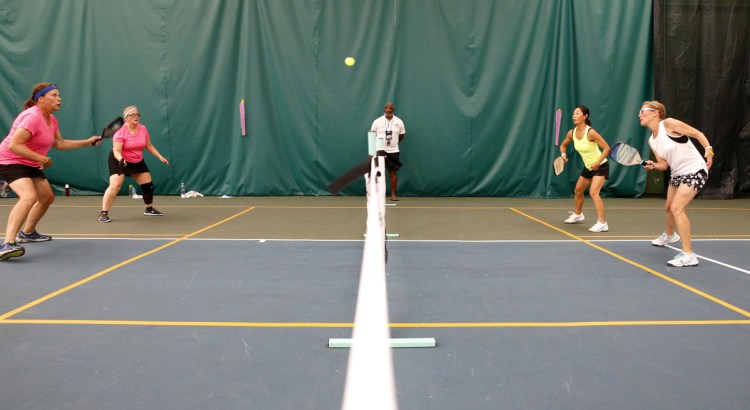Susan Starbird of Hampden said the greatest help she has found in managing her bipolar disorder has been from the sport of pickleball.
Likewise, Venus Belanger of Sherbrooke, Quebec, said pickleball has helped her live an active life in the face of bone cancer because it’s a low-impact sport that tests her endurance and fitness.
They were two of more than 500 enthusiasts who descended on Portland this weekend for the USA Pickleball Association’s Atlantic Regional. The three-day event, at The Racket and Fitness Center through Sunday, is the largest racket sport tournament ever played in Maine – and possibly the largest in the Northeast.
The event is drawing players from Canada and 25 states, including Texas, California, Idaho and South Dakota. Competition includes singles and doubles play at varied skills levels for players from age 19 to 80 and above.
The sport with the silly name is gaining in popularity at such a clip that devotees say it’s only a matter of time before it’s as well-known as other sports.
“It’s not a fad. It’s here to stay. It will be an Olympic sport,” said Rocky Clark of Portland, director of the Atlantic Regional. “And it will eventually be an NCAA sport.”
And as for that quirky name?
“Think about it: basketball. Or ping-pong. Or badminton,” Clark said. “How are those not silly names?”
Pickleball is played on a court less than half the size of a tennis court with paddles twice as big as those in ping-pong. It uses a plastic ball similar to a whiffle ball and, because of the tiny court size, requires fast action but less running than in tennis.

Dennis Shaw, 75, right, of Wolfeboro, N.H., says, “For older people, (pickleball) gives them a reason to get off the couch. It’s something to keep them active and gives them a reason to get up in the morning.”
In 2017 there were an estimated 2.8 million pickleball players in the United States, according to the Sports and Fitness Industry Association, an increase of 12 percent over 2016. Of those, 22,120 were members of the USA Pickleball Association, including 400 from Maine.
The Atlantic Regional is in Portland for the second time in three years after being held last year in Hartford, Connecticut. The 2016 regional – held for the first time in Portland – drew 317 players. This year Clark had to turn people away after capping registration at 515 participants.
“The venue is our only limitation. We could have taken 700 to 800,” he said. “I think what will happen next year is it will sell out faster, like the Beach to Beacon.”
When Clark started playing seven years ago, he said there were only 40 players in Maine. Today he estimates there are 1,500 players in the state.
In 2016, there were 68 pickleball sites in Maine listed on the USAPA web site. At last count there were 82, said Justin Maloof, the USAPA executive director. And more are springing up.
Next week Belfast will have a grand opening for its pickleball courts, and “court lines” were added at tennis courts at Deering Oaks last year and on the Eastern Promenade in Portland a month ago.
Players say the sport continues to grow because it’s easy to learn, easier to play than tennis, and the gear is a lot cheaper: on average about $100-150.
“In 15 minutes I can have someone who’s never hit a ball playing pickleball and enjoying it,” said Clark, an instructor and gold medalist at the 2017 USAPA Nationals.
But the stories probably measure the pickleball craze better than the statistics.
Consider Rodney Grubbs of Brookville, Indiana. Grubbs retired 20 years ago and fell in love with the sport quickly after starting to play a decade ago. Soon he made a T-shirt that read: “Pickleball Rocks. Ask me how.” Residents in town saw the shirt and asked to teach them.
Today, Grubbs and his wife, Karen, travel to tournaments in the U.S. and Europe. His family now runs a popular web site selling pickleball gear and apparel.
“My two sons quit their jobs and came to work for me,” Grubbs said.
Robert Rowse of Falmouth stumbled into a pickleball game in town three years ago. Like Grubbs, he was instantly hooked.
“I went home and said to my wife, ‘I just played the coolest game. It’s like playing ping-pong but you’re standing on the court,” said Rowse, 62.
Now he plays every day.
Then there’s Starbird, the player from Hampden. She’s taught nearly 100 people how to play and arranges play at two venues.
“It is so good for you physically and emotionally and mentally,” Starbird said. “I’ve met the most wonderful people. I’ve taught a few prodigy who became teachers. I’m very proud of that.”
Deirdre Fleming can be reached at 791-6452 or:
dfleming@pressherald.com
Twitter: FlemingPph
Send questions/comments to the editors.




Success. Please wait for the page to reload. If the page does not reload within 5 seconds, please refresh the page.
Enter your email and password to access comments.
Hi, to comment on stories you must . This profile is in addition to your subscription and website login.
Already have a commenting profile? .
Invalid username/password.
Please check your email to confirm and complete your registration.
Only subscribers are eligible to post comments. Please subscribe or login first for digital access. Here’s why.
Use the form below to reset your password. When you've submitted your account email, we will send an email with a reset code.